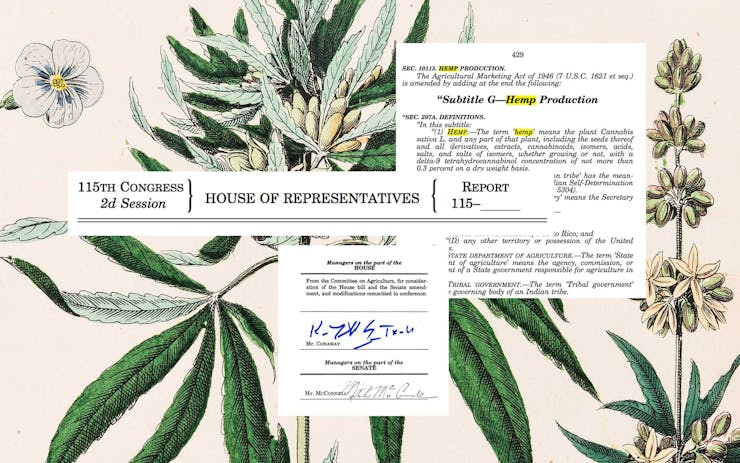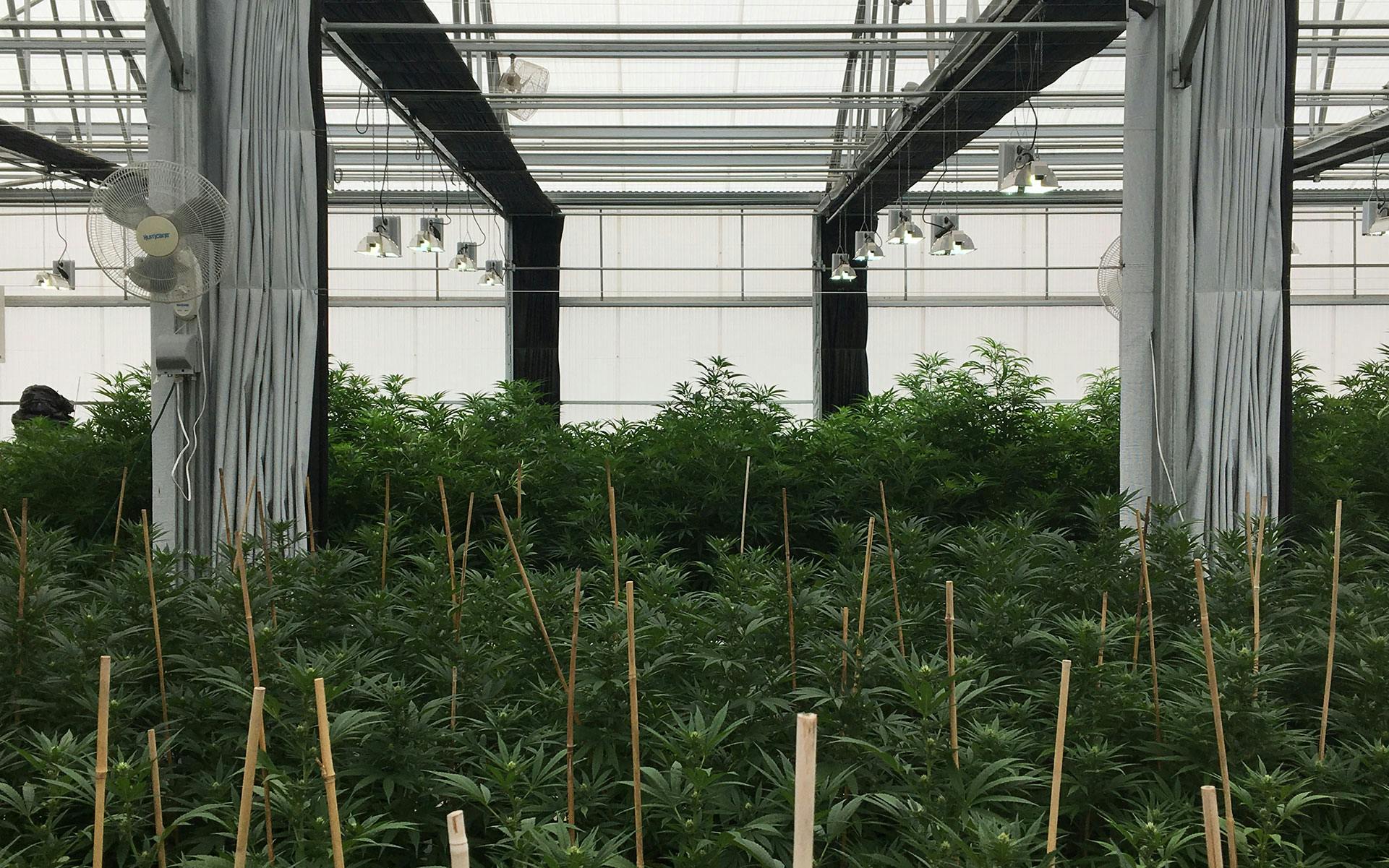In 1985, legendary cannabis activist Jack Herer published a magnum opus called The Emperor Wears No Clothes, which through painstaking research told the hidden history of hemp—a once-revered crop cultivated for more than 10,000 years that played a vital role in America’s economy from colonial times until the Marijuana Tax Act of 1937 made growing it a federal crime.
“It’s hard to overstate the importance of the Farm Bill’s passage for the US hemp industry. It’s basically the starting gun.”
Herer’s underground bestseller argued that ending hemp’s misguided prohibition, and allowing a commercial crop to flourish once again, would yield incredible benefits, including but not limited to feeding the world, freeing us from fossil fuels, reversing climate change, replacing plastics, ending the housing crisis, and restoring our planet’s depleted soils.
“I don’t know if hemp is going to save the world,” Herer once famously opined, “but it’s the only thing that can.”
The man who came to be known as The Hemperor passed away in 2010, but his legacy lives on in an unlikely place—an amendment to the 2018 Farm Bill, added by US Senate Majority Leader Mitch McConnell, that removes industrial hemp from regulation under the Controlled Substances Act, making it a legal agricultural commodity for the first time in more than eighty years.
That bill was passed by the Senate on Tuesday, and found approval in the House on Wednesday, Dec. 12. President Trump is expected to sign it into law later this week.
Jack Herer’s dream has finally come true. Hemp is legal, nationwide.Mom Asking for CBD?
It’s Rope, Not Dope
“Farming communities all over the country are interested,” McConnell told the Senate Agriculture Committee in June, while advocating for this historic policy change. “Our number one cash crop [in Kentucky] used to be something that’s really not good for you: tobacco. And that has declined significantly, as it should, given the public health concerns.”
Long considered a far-left pipe dream of American politics, hemp re-legalization got pushed over the finish line this week by conservative, tobacco state politicians searching for a profitable crop replacement.
These same rural areas now looking to hemp as a potential savior have historically been some of the most hostile to cannabis, at least in its mood-altering form.
Which makes it pretty ironic that while hemp activists used to chant “it’s rope, not dope” in order to distinguish industrial hemp from the kind of cannabis that gets you high, a big part of the reason hemp is about to get legalized has nothing to do with eating nutritious hemp seeds, or wearing a durable hemp shirt; people have been eating and wearing hemp since ancient times.
Even Your Uncle Wants CBD
What’s new is the rising demand for cannabidiol—better known as CBD—a molecule found naturally in the cannabis plant with proven anti-seizure and other benefits. Traditionally, industrial hemp has had extremely low levels of both THC and CBD. But according to the new Farm Bill, a “cannabis sativa” plant is now considered hemp (and therefore federally legal to grow and process) so long as it doesn’t exceed 0.3%.
THC on a dry weight basis—no matter how much CBD (or other cannabinoids) it produces.
Looking For Legal Hemp-Derived CBD? Leafly Has It
And so, the CBD-rich hemp boom is set to ignite.
“It’s hard to overstate the importance of the Farm Bill’s passage for the US hemp industry,” according to Doug Fine, author of Hemp Bound: Dispatches from the Front Lines of the Next Agricultural Revolution. “It’s basically the starting gun.”
Five years ago, the 2014 Farm Bill officially ended hemp prohibition by allowing farmers in a small number of states to grow limited crops for research purposes, often in conjunction with a university’s agricultural studies department. This year, just 77,000 acres were planted, but that number will likely skyrocket next year when almost all federal impediments to hemp farming fall, and regulation of the once banned agricultural commodity is left to individual states.
According to a report from Hemp Business Journal, in 2017, retail sales for all hemp products combined brought in an estimated $820 million dollars, with hemp-derived CBD accounting for 23% of that market. But according to the Brightfield Group, a market research firm specializing in CBD, that’s old news. Because the hemp-derived CBD market is already growing far faster than the legal weed market, and with domestic hemp cultivation now legal, they predict that by 2022 it will be a $22 billion dollar industry.
Colin Peterson, a Democratic representative from Minnesota, and ranking member of the House Agricultural Committee, not only supports these sweeping policy changes, he recently told Minnesota Public Radio he’s considering following in the footsteps of George Washington and Thomas Jefferson.
“I may grow some hemp on my farm,” he said. “I’m looking at it. There’s a big market for this stuff that we’ve been ceding to Canada and other places.”
Peterson is like most American farmers hoping to grow hemp, in that he’s primarily motivated by a per-acre profit margin that’s expected to be many times higher than corn. But what about the hemp movement’s long-standing activists, evangelists, and true believers, who’ve kept the truth about hemp alive throughout the darkest days of propaganda and prohibition?
Let’s See if Hemp Can Save the World
Former California state senator Mark Leno carried that torch for two decades, including by authoring a 2014 law creating a statutory framework for farmers to grow hemp in the state, though one that would only become active once the federal government gave its blessing.
Now that the day he’s been waiting for has finally arrived, Leno says he’s excited to see if hemp really can save the world.
“Legalizing hemp farming will bring profound fiscal and environmental benefits,” he tells Leafly. “I’m certain that thousands or tens of thousands of American jobs will be created by this new industry, which will also bring in significant tax revenue. From hemp we can produce food, clothing, shelter, paper, fuel, and medicine—all made from a miracle plant that can be grown with far, far less pesticides and water usage than corn. When it comes to how that will affect society and the planet, I don’t think the word transformative is an overstatement.”








